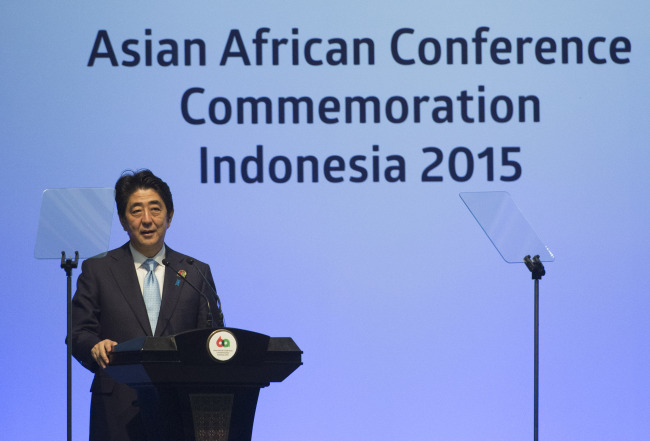Japanese Prime Minister Shinzo Abe expressed “deep remorse” Wednesday for Japan’s World War II aggression at a summit attended by Asian leaders, but stopped short of repeating previous apologies in a move that risks angering Beijing and Seoul.
However there were also signs of a thaw with China, with Abe and Chinese President Xi Jinping shaking hands as the summit in Indonesia got underway and a Tokyo official saying that the ground was being laid for the pair to meet on the sidelines. A new meeting would be a significant step toward easing long-running tensions over Tokyo’s wartime past and territorial disputes.
The leaders have only met once before, at a summit in November last year in China, where they shared an awkward handshake, but have never had a formal sit-down.

Shinzo Abe speaks during the Asia-Africa Summit in Jakarta on Wednesday. (Xinhua-Yonhap)
The speech by Abe, a strident nationalist, at the Asia-Africa Summit in Jakarta was being closely watched for clues about a statement he is due to make later this year marking the 70th anniversary of the end of World War II.
At the start of the two-day summit, which commemorates a key conference 60 years ago that helped emerging nations forge a common identity, he offered weaker remarks than previous Japanese leaders ― potentially a bad omen for the closely-watched statement later this year.
Referring to principles of peace laid down at the original conference, he told delegates: “And Japan, with feelings of deep remorse over the past war, made a pledge to remain a nation always adhering to those very principles throughout, no matter what the circumstances.”
Earlier in the day, more than 100 Japanese lawmakers paid homage at the Yasukuni war shrine, risking fresh anger from Asian neighbors that fell victim to Tokyo’s aggression last century.
A cross-section of parliamentarians paid their respects at the shrine in central Tokyo as part of the spring festival.
A total of 106 lawmakers visited, the group said, however no cabinet ministers were seen among them.
South Korea Wednesday criticized the lawmakers.
“It is an act of negating the premise for Japan to return to the international community after World War II,” a South Korean Foreign Ministry official said. The shrine honors 14 convicted war criminals among many other war veterans enshrined there, he pointed out.
Since Abe’s return to power in 2012, Japan’s relations with South Korea and China have worsened over their shared history.
President Park Geun-hye has rejected Abe’s request for bilateral summit talks in protest of Japan’s attempt to gloss over its wartime atrocities and territorial claim to South Korea’s easternmost islets of Dokdo in the East Sea. Japan colonized Korea from 1910-45.
Abe drew sharp rebukes from China and South Korea on Tuesday after sending a symbolic offering to the shrine. He has not visited since December 2013.
From news reports






